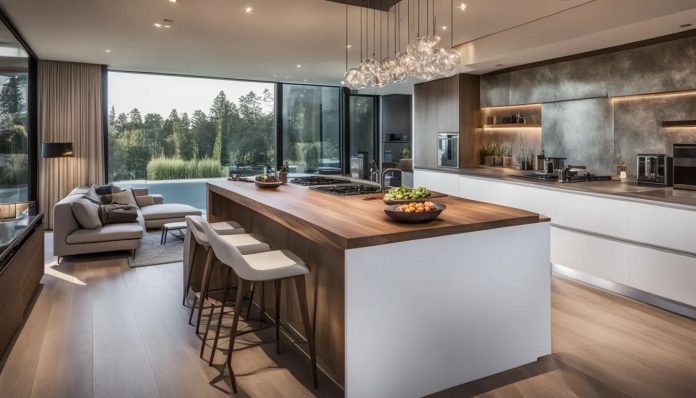Design a modern kitchen island that features a bold color and wood countertop.
The kitchen island has become a central feature in modern kitchens, offering functionality, style, and a focal point for design. A well-designed kitchen island can transform a cooking space into a stylish and efficient area for preparing meals, entertaining guests, and enjoying family time. This article will guide you through the process of designing a modern kitchen island that combines a bold color with a wood countertop, creating a striking and functional centerpiece for your kitchen.
Table of Contents
ToggleConcept and Design Vision: Blending Boldness with Warmth
A modern kitchen island should balance bold design elements with practical functionality. The goal is to create an island that stands out with a bold color while incorporating a warm, natural wood countertop to add contrast and texture. Here’s how you can achieve this:
Choosing a Bold Color
The color of the kitchen island can set the tone for the entire kitchen. Bold colors can make a strong statement and serve as a visual anchor. Some popular choices for bold colors include:
- Deep Blue: Adds a touch of sophistication and pairs well with natural wood tones.
- Emerald Green: Offers a rich, luxurious feel that complements a variety of kitchen styles.
- Charcoal Gray: Provides a modern and sleek look that contrasts beautifully with warm wood.
- Vibrant Teal: Adds a pop of color and freshness to the kitchen space.
Selecting the Right Wood Countertop
The wood countertop should not only complement the bold color of the island but also provide durability and warmth. Popular wood choices for countertops include:
- Maple: Known for its light, warm tone and smooth grain, it works well with various colors.
- Walnut: Offers a darker, rich hue that creates a striking contrast with bold colors.
- Oak: A versatile option with a classic look and strong durability.
- Butcher Block: Provides a rustic, practical surface ideal for a busy kitchen.
Design Elements: Functionality and Aesthetics
Incorporating both aesthetic and functional elements into your kitchen island design is crucial for creating a cohesive and practical space.
Layout and Dimensions
The layout and dimensions of the kitchen island should be tailored to your kitchen’s size and your needs. Consider the following:
- Size: Ensure the island is proportionate to your kitchen. It should be large enough to serve its intended functions but not overwhelming.
- Shape: Choose a shape that complements the layout of your kitchen. Options include rectangular, square, or even a rounded design.
- Seating: Decide whether you want to include seating at the island. Barstools or counter-height chairs can be integrated into one side for additional functionality.
Storage and Features
Incorporate practical features into the island design to maximize its utility:
- Cabinetry: Include cabinets or drawers for storage of kitchen essentials, utensils, and cookware.
- Built-In Appliances: Consider integrating appliances such as a microwave or wine cooler for added convenience.
- Sink and Cooktop: If space allows, you can add a small sink or cooktop to the island, making it a multifunctional workspace.
Lighting
Proper lighting is essential to highlight the beauty of the island and ensure functionality:
- Pendant Lights: Install pendant lights above the island to provide focused lighting and enhance the design.
- Under-Cabinet Lighting: Add under-cabinet lighting to illuminate the workspace and create a warm ambiance.
- Recessed Lighting: Use recessed lighting in the ceiling to ensure even illumination throughout the kitchen.
Material Choices and Finishes
Selecting the right materials and finishes will impact both the aesthetic appeal and durability of the kitchen island.
Bold Color Finish
For the bold color, consider the following finishes:
- High Gloss: Provides a sleek, modern look and reflects light, enhancing the color’s vibrancy.
- Matte: Offers a more subdued, sophisticated appearance and is less prone to showing fingerprints.
- Textured: Adds visual interest and can create a unique effect when paired with the wood countertop.
Wood Countertop Finish
The finish of the wood countertop should complement the bold color while ensuring durability:
- Natural Oil: Enhances the wood’s natural beauty and offers a warm, classic look.
- Polyurethane: Provides a durable, protective layer that is easy to maintain and clean.
- Stained: Choose a stain that complements the bold color and adds depth to the wood’s appearance.
Integrating the Island into Your Kitchen
To ensure the kitchen island seamlessly integrates with the rest of your kitchen, consider the following:
- Color Scheme: Ensure the bold color of the island complements the overall kitchen color scheme. It should harmonize with cabinets, walls, and flooring.
- Style Consistency: Match the island’s design with the kitchen’s style, whether it’s contemporary, traditional, or eclectic.
- Flow and Function: Ensure the island’s placement allows for smooth traffic flow and easy access to other kitchen areas.
A Bold and Functional Centerpiece
Designing a modern kitchen island with a bold color and wood countertop can create a stunning centerpiece that enhances both the functionality and aesthetic of your kitchen. By carefully selecting colors, materials, and features, you can craft an island that stands out and serves as a versatile hub for cooking, entertaining, and enjoying time with family. Embrace creativity and practicality to create a kitchen island that reflects your personal style and meets your needs.








